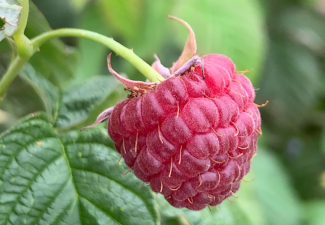More than one million euros allocated for several crucial horticultural research projects in Latvia

The Institute of Horticulture (LatHort) has been granted the opportunity to lead three scientific projects and participate as a partner in another research study through the Latvian Council of Science’s Fundamental and Applied Research Projects competition. These projects will significantly contribute to the horticultural sector in Latvia. A total funding of 1,199,958 EUR has been awarded to the LatHort for these projects.
One of the studies will focus on viruses that cause raspberry bush stunt and drupelet disorder, as raspberry virus diseases not only affect yield but also significantly impact fruit quality.
To date, raspberry bush stunt virus (Idaeovirus rubi; RBDV), along with other viruses infecting Rubus species, has not been studied in Latvia, and the spread and symptoms of these viruses are not well understood. The aim of this research is to gain new knowledge about the viral complex involved in the formation of raspberry drupelet disorder and to evaluate the effectiveness of applied plant recovery methods. Since RBDV spreads through infected pollen and can also infect grapevines and cherries, the only way to control its spread is by using virus-free planting material for new plantations and growing resistant varieties. During the study, the involvement of RBDV and other viruses in the development of raspberry drupelet disorder will be clarified, and diagnostic methods for these viruses will be developed. For the first time, biopreparation allicin will be used to recover infected plants, and virus-resistant vector prototypes will be created, which can later be used in studies on the resistance of raspberry varieties to the virus.
The lead researcher for this study will be PhD Neda Zuļģe, and the allocated funding is 300,000 EUR.
The second study will address the well-known pear-juniper rust, which threatens the existence of pears as an economically significant fruit crop.
For some time, pear-juniper rust (Gymnosporangium sabinae), caused by a pathogenic fungus that affects both juniper and pear plants, has been a significant issue for pear cultivation. This disease inhibits photosynthesis, slows down fruit development, and reduces yields. Control of the disease is mainly done with fungicides – chemicals used to eliminate or inhibit the development of pathogenic fungi. With increasing demand for environmentally friendly farming strategies, including reducing pesticide use, alternatives to fungicides are becoming more relevant. Although there are no completely resistant pear varieties to pear-juniper rust, earlier research has identified several genotypes with stable resistance. Therefore, this study aims to create a scientific and breeding foundation for the selection of pear varieties resistant to this disease.
The lead researcher for this study will be PhD Gunārs Lācis, and the allocated funding is 299,961 EUR.
The third study will focus on the valuable composition of industrially significant monocot plants from the Arecaceae and Poaceae families, such as oil palm and grasses.
A large portion of biomass from industrial processing becomes by-products, which is why comprehensive zero-waste solutions are needed for the processing of these crops. Palm and bran oil contain tocotrienols, compounds of vitamin E. Information about natural tocotrienol sources remains limited, and a chemical-taxonomic approach could be a useful tool for identifying them. The use of palm oil in food production is steadily declining, although many products are still labeled as palm oil-free. However, traces of palm oil are often detected in smaller oil concentrations. Tocotrienols are rare in plant-based raw materials, making them useful as biomarkers for identifying palm oil and verifying product authenticity. The project aims to create new knowledge about potential tocotrienol sources and isolate them using environmentally friendly extraction methods. A new method will be developed to detect food fraud and identify multiple indicators in a single analysis, which was previously not possible.
The lead researcher for this study will be PhD Pawel Gornas, and the allocated funding is 299,997 EUR .
In collaboration with the Latvian Biomedical Research and Study Centre, LatHort scientists will also contribute to the study of the diversity of phytopathogenic bacteria associated with the Rosaceae family in Latvia.
The aim is to identify a potential bacteriophage "cocktail" prototype effective against the most common bacterial strains in Latvia that threaten Rosaceae plants.
Rosaceae crops (such as apples, pears, and rowan) often suffer from diseases caused by phytopathogenic bacteria, which pose a significant economic burden. The diversity and dynamics of these bacteria in Latvian horticulture are still insufficiently studied, hindering the development of alternative control measures. Furthermore, traditional control methods are often ineffective due to bacterial resistance, prompting research into alternative solutions. The use of bacteriophages for biocontrol of pathogenic organisms is a promising and environmentally friendly solution.
The "RoseXPhLORE" project will serve as a pilot study that will significantly reduce the information gap and initiate dynamic research into the diversity of Rosaceae-associated phytopathogenic bacteria in Latvia using next-generation sequencing (NGS). At the same time, isolates of these phytopathogenic bacteria will serve as targets for the search for specific bacteriophages.
The lead researcher for this project will be Dr. biol. Andris Dišlers, with Dr. agr. Dzintra Dēķena from the Horticulture Institute, and it has been allocated 300,000 EUR.
The projects will begin on January 1, 2025.
Please find more detailed description on Projects here: https://rb.gy/1ixqho